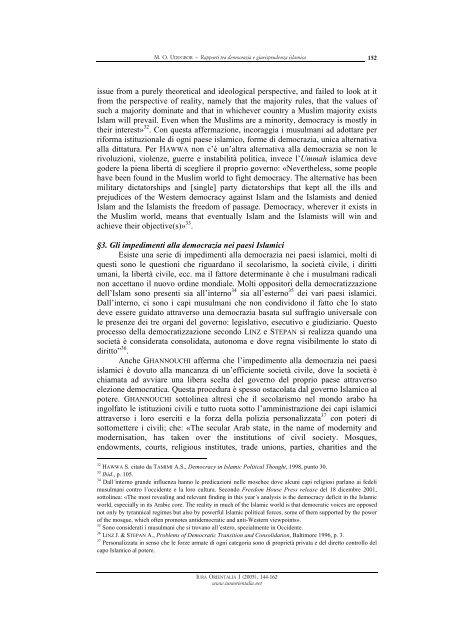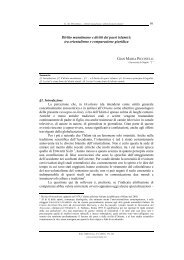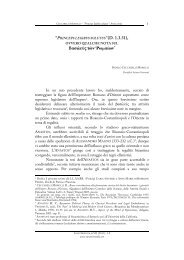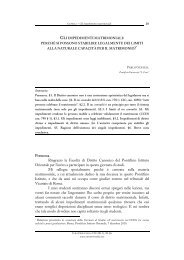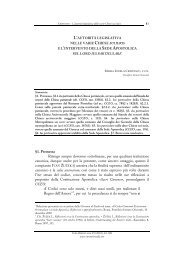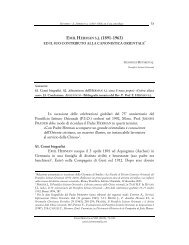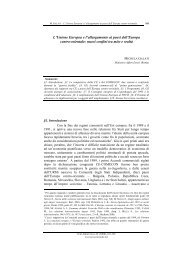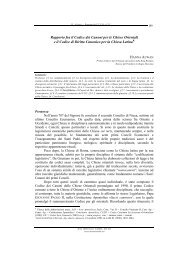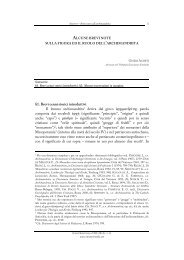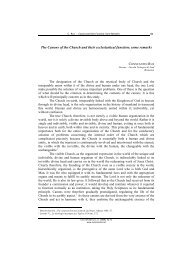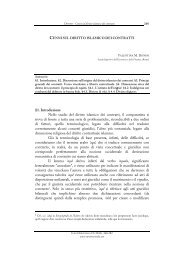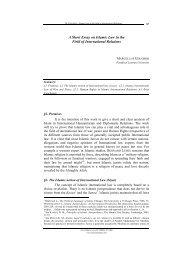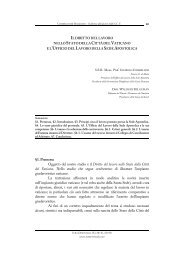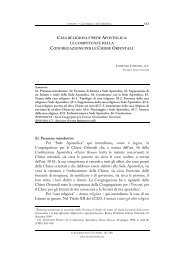di Marcellus Okenwa Udugbor - iura orientalia
di Marcellus Okenwa Udugbor - iura orientalia
di Marcellus Okenwa Udugbor - iura orientalia
Create successful ePaper yourself
Turn your PDF publications into a flip-book with our unique Google optimized e-Paper software.
M. O. UDUGBOR – Rapporti tra democrazia e giurisprudenza islamica152issue from a purely theoretical and ideological perspective, and failed to look at itfrom the perspective of reality, namely that the majority rules, that the values ofsuch a majority dominate and that in whichever country a Muslim majority existsIslam will prevail. Even when the Muslims are a minority, democracy is mostly intheir interest» 32 . Con questa affermazione, incoraggia i musulmani ad adottare perriforma istituzionale <strong>di</strong> ogni paese islamico, forme <strong>di</strong> democrazia, unica alternativaalla <strong>di</strong>ttatura. Per HAWWA non c’è un’altra alternativa alla democrazia se non lerivoluzioni, violenze, guerre e instabilità politica, invece l’Ummah islamica devegodere la piena libertà <strong>di</strong> scegliere il proprio governo: «Nevertheless, some peoplehave been found in the Muslim world to fight democracy. The alternative has beenmilitary <strong>di</strong>ctatorships and [single] party <strong>di</strong>ctatorships that kept all the ills andpreju<strong>di</strong>ces of the Western democracy against Islam and the Islamists and deniedIslam and the Islamists the freedom of passage. Democracy, wherever it exists inthe Muslim world, means that eventually Islam and the Islamists will win andachieve their objective(s)» 33 .§3. Gli impe<strong>di</strong>menti alla democrazia nei paesi IslamiciEsiste una serie <strong>di</strong> impe<strong>di</strong>menti alla democrazia nei paesi islamici, molti <strong>di</strong>questi sono le questioni che riguardano il secolarismo, la società civile, i <strong>di</strong>rittiumani, la libertà civile, ecc. ma il fattore determinante è che i musulmani ra<strong>di</strong>calinon accettano il nuovo or<strong>di</strong>ne mon<strong>di</strong>ale. Molti oppositori della democratizzazionedell’Islam sono presenti sia all’interno 34 sia all’esterno 35 dei vari paesi islamici.Dall’interno, ci sono i capi musulmani che non con<strong>di</strong>vidono il fatto che lo statodeve essere guidato attraverso una democrazia basata sul suffragio universale conle presenze dei tre organi del governo: legislativo, esecutivo e giu<strong>di</strong>ziario. Questoprocesso della democratizzazione secondo LINZ e STEPAN si realizza quando unasocietà è considerata consolidata, autonoma e dove regna visibilmente lo stato <strong>di</strong><strong>di</strong>ritto” 36 .Anche GHANNOUCHI afferma che l’impe<strong>di</strong>mento alla democrazia nei paesiislamici è dovuto alla mancanza <strong>di</strong> un’efficiente società civile, dove la società èchiamata ad avviare una libera scelta del governo del proprio paese attraversoelezione democratica. Questa procedura è spesso ostacolata dal governo Islamico alpotere. GHANNOUCHI sottolinea altresì che il secolarismo nel mondo arabo haingolfato le istituzioni civili e tutto ruota sotto l’amministrazione dei capi islamiciattraverso i loro eserciti e la forza della polizia personalizzata 37 con poteri <strong>di</strong>sottomettere i civili; che: «The secular Arab state, in the name of modernity andmodernisation, has taken over the institutions of civil society. Mosques,endowments, courts, religious institutes, trade unions, parties, charities and the32 HAWWA S. citato da TAMIMI A.S., Democracy in Islamic Political Thought, 1998, punto 30.33 Ibid., p. 105.34 Dall’interno grande influenza hanno le pre<strong>di</strong>cazioni nelle moschee dove alcuni capi religiosi parlano ai fedelimusulmani contro l’occidente e la loro cultura. Secondo Freedom House Press release del 18 <strong>di</strong>cembre 2001,sottolinea: «The most revealing and relevant fin<strong>di</strong>ng in this year’s analysis is the democracy deficit in the Islamicworld, especially in its Arabic core. The reality in much of the Islamic world is that democratic voices are opposednot only by tyrannical regimes but also by powerful Islamic political forces, some of them supported by the powerof the mosque, which often promotes antidemocratic and anti-Western viewpoints».35 Sono considerati i musulmani che si trovano all’estero, specialmente in Occidente.36 LINZ J. & STEPAN A., Problems of Democratic Transition and Consolidation, Baltimore 1996, p. 3.37 Personalizzata in senso che le forze armate <strong>di</strong> ogni categoria sono <strong>di</strong> proprietà privata e del <strong>di</strong>retto controllo delcapo Islamico al potere.IURA ORIENTALIA I (2005), 144-162www.<strong>iura</strong><strong>orientalia</strong>.net


